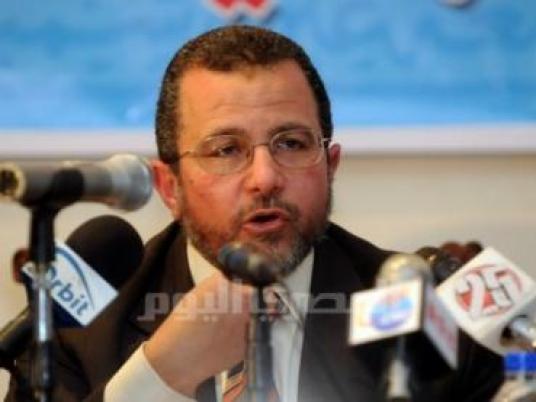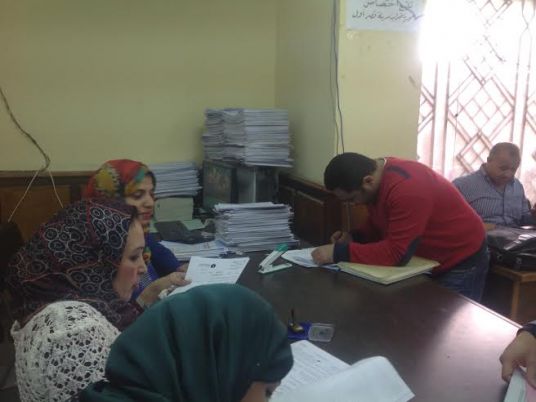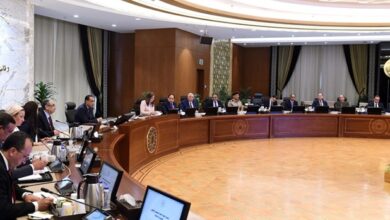
The prime minister appeared on TV last week to share his vision for the future. But whether this will include him at the helm of the Cabinet is unclear, as his statements coincide with speculations about his removal — or at least the reshuffling of some ministers.
“I am fully aware of the fears in the country, but my evaluation of the scene differs from the ordinary citizen. We are in a transitional stage and everyone has to be aware of that,” Hesham Qandil, the first prime minister appointed by President Mohamed Morsy after his election, said. “We do not have the experience to run a stage as such, and any person who claims otherwise is not being honest.”
The dismissal of the Qandil Cabinet could almost be described as a consensus demand for chief opposition powers such as the National Salvation Front (NSF) coalition, as well as influential Islamist groups such as the Salafi Nour Party. The NSF has made the removal of the Cabinet a prerequisite for joining the national dialogue.
For some observers, the demand for Qandil’s government to go is only normal, given its multiple failures.
The main rescue mission — fixing the country’s dwindling economy — is a case in point.
The Central Bank of Egypt said net direct foreign investments declined in the first quarter of fiscal year 2012/13 by 14.1 percent, compared with the same quarter in FY 2011/12. International financial institutions have also lowered the country’s credit rating. Meanwhile, the unemployment rate climbed to 13 percent by the end of the last quarter of 2012, compared with 8.9 percent in the same quarter of 2010.
Politically, reports of ongoing police violations and continuing violence and unrest across the country have also hampered advances toward stability. Road and train crashes are further exacerbating the situation.
Yet, despite everything, the president’s office insists on keeping the Qandil Cabinet. Last week, the presidency announced it had no intention of changing the Cabinet, after presidential sources leaked news about a possible reshuffle in which the prime minister would keep his post.
The Muslim Brotherhood’s Freedom and Justice Party (FJP) leaders say there is no need to change the Cabinet, since the forthcoming parliament would decide its new formation anyway.
“Let me tell you that we are not entirely satisfied with Qandil’s Cabinet, for nobody can deny the fragility of the economic situation in the country,” says Mohamed Gouda, head of the FJP’s economic committee.
But he questions why the Cabinet should be changed now, with Parliament soon to choose another.
“Consultations to form a new cabinet could take at least a month, which would be a waste of time,” he says.
For the opposition, the upcoming parliamentary election is the main reason why the Qandil Cabinet is staying. Many in the opposition believe the FJP wants to keep the Cabinet to ensure the election is carried out with leaders from the group currently in the Cabinet still in their places, in order to directly steer the polls.
Abdallah al-Sennawy, editor-in-chief of the Arab Nasserist magazine of the opposition, agrees that the upcoming parliamentary polls are the main reason why the Qandil Cabinet is still in power. The opposition’s demand for the Cabinet’s removal and the appointment of a public national figure as prime minister reflects their fears that state institutions will be in the FJP’s hands and exploited to serve the party’s interests.
Meanwhile, some say decision-making processes are not following a government plan, but rather the wishes of the president’s office and, by extension, the Brotherhood.
Experts say the Qandil Cabinet stopped short of undertaking austerity measures to bolster the tottering economy out of fear of alienating voters. The Cabinet reneged on two decisions that were supposedly part of an economic plan it presented to the International Monetary Fund to obtain a loan of US$4.8 billion and reduce this fiscal year’s budget deficit from 13 to 8.5 percent.
In October, the Qandil Cabinet backpedaled on its decision to have shops close at 10 pm to cut energy consumption after broad sectors of traders rejected the decision.
The second decision the Cabinet reversed — only hours after it was made — was the cancellation of a series of taxes on some commodities, such as cigarettes, liquor, fizzy drinks, electricity and real estate.
Reda Eissa, an economic expert, says both measures were circumvented for political reasons.
“Even though the Qandil Cabinet has followed in the footsteps of the cabinets of the former regime of ex-President Hosni Mubarak, adopting the same neo-liberal approach, borrowing from abroad, imposing taxes and adopting austerity measures whose burden falls on the poor rather than the rich, Morsy and his group fear their popularity will decline among low-income categories,” he says. “They worry that these groups will not vote for them in elections, and so they decided to go back on those decisions, even if those measures were necessary to get the IMF loan.”
Alaa Abdel Moneim, a former independent MP and an NSF member, explains that the Cabinet formation is critical to the electoral battle on which the Brothers are about to embark.
He explains that when Qandil formed his Cabinet in August, he chose leaders from the Brotherhood or figures with close links to the Brotherhood to head five ministries. Those were the Youth, Manpower, Housing, Information and Justice ministries. Then, in January, he had Brotherhood figures lead the Finance, Supply and Local Development ministries.
Each of these ministries deals directly with the people, Abdel Moneim adds. For instance, the Supply Ministry supervises butane gas storehouses and bread bakeries.
“Some citizens in isolated areas have said members from the FJP oversee those storehouses and at the same time promote their party in the election,” says Abdel Moneim.
The Youth Ministry is known to control more than 4,300 youth centers, where dozens of young people and their families go every day. These could also be used in election campaigning, particularly after the Cabinet approved the allocation of LE470 million to the development of youth centers, yet declined a similar request from the Culture Ministry for LE70 million to develop its establishments.
Moreover, a Brotherhood leader from the Supreme Guidance Bureau, Mohamed Ali Beshr, was appointed local development minister, at the helm of the ministry responsible for supervising administrative local councils in the elections.
Abdel Moneim says all those incidents prove that the Brotherhood has set the coming elections as a priority, and the existing Cabinet is the guarantee for it to stay in power.
But Gouda calls these accusations and not facts.
“It is the High Judicial Elections Commission, a judicial committee, that will supervise the election. The Cabinet has nothing to do with it,” he says.
In the meantime, the Supreme Constitutional Court said Tuesday that four articles of the elections law submitted by the Shura Council were unconstitutional, which requires the Shura Council — the current legislator — to amend the law, or else the upcoming elections may be deemed unconstitutional.
These developments may lead to the postponement of the parliamentary elections, which the president should call for on 26 February — 60 days after the Constitution is drafted. For some, this renders void the Brotherhood argument that changing the Cabinet is premature.
Gouda, however, says the president may still call for the election on 26 February, but open the door for nominations at a later date in March, to allow time to amend the law.
“Forming a new cabinet will only ignite tensions and political disagreements,” Gouda insists.
Meanwhile, news reports indicated negotiations were ongoing with Ghad al-Thawra Party President Ayman Nour, who has recently joined Morsy’s call for dialogue, unlike most opposition groups and Kamal al-Ganzouri, the former prime minister previously appointed by Mubarak and the interim ruling military council to form a technocratic Cabinet.
Nour dismissed the news as incorrect, while Ganzouri rejected the post, reportedly because he did not trust that he would have the freedom to choose ministers responsible for the economy.
This article was translated by Dina Zafer.
This piece appears in Egypt Independent's weekly print edition.




